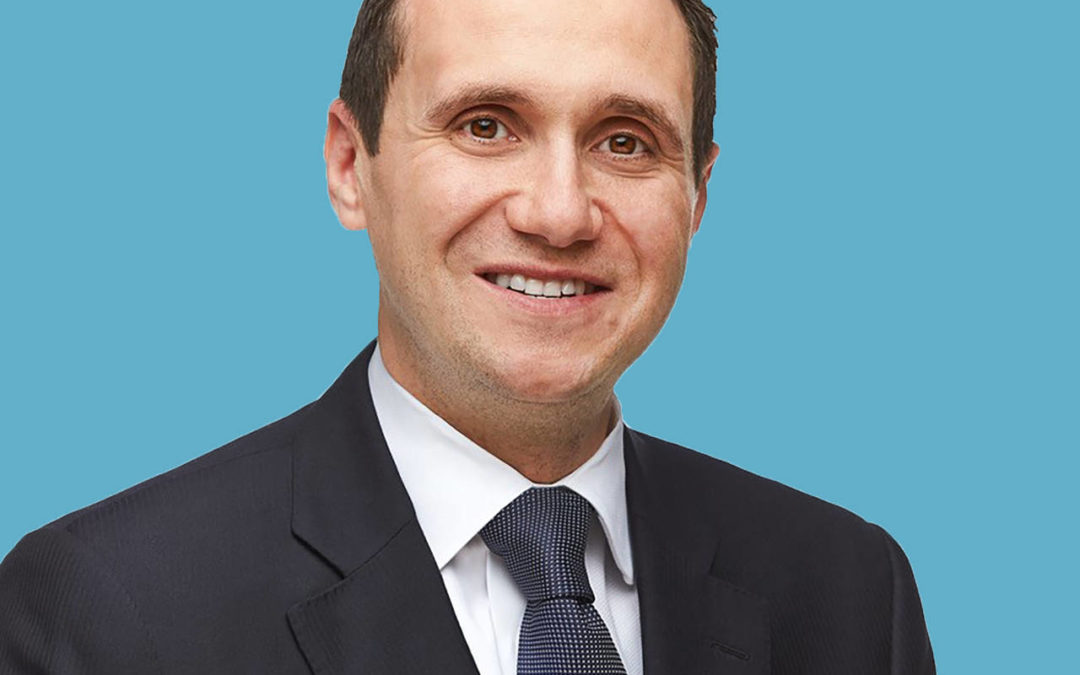To stay at the top, the firm is searching for opportunities in ‘buy-and-build’ and ‘hard-to-reach places’, says Dan Zilberman, its boss in Europe
Warburg Pincus had its best year in Europe in 2019, according to the region’s boss Dan Zilberman.
But with a record level of dry powder in the industry and the growing risk of an economic downturn, he has his work cut out for him to keep the momentum going.
Zilberman believes help will come from unexpected quarters. In an interview with FN’s sister-publication Private Equity News, the 47-year-old from New York professes to be particularly bullish on the UK, arguing that the economy is robust despite the uncertainty caused by political wrangling over Brexit.
“We think this is a strong economy. It’s actually a great market but it’s been frozen for two and a half years,” he explains. He argues that now, as companies finally start making the decisions they delayed for so long, there will be real opportunities for investment.
To back his confidence in the UK, Zilberman points to clothing retailer Reiss, one of the best performing companies in the firm’s portfolio.
In the year to February 2019, earnings before interest, tax, depreciation and amortisation were up 21.3% to £19.3m, and Zilberman expects it to be up about 55% this year. He says he is a firm believer in the brand despite the UK high street’s widely publicised troubles — and the fact that Zilberman doesn’t wear its clothes to the office: “Most of my casual stuff is from Reiss!”, he protests.
“What Reiss says is UK retail is not dead, you just have to execute,” he explains. “We bought a venerable British brand…we brought in a new management team… The model which also works is the Reiss model, which is omni-channel – bricks and mortar and online.”
After Warburg Pincus took a majority stake in Reiss in 2016, in a deal that valued the business at £230m, Zilberman explains, the company went through a period of restructuring. It shut some of its stores — including a total pull-out from Russia — and opened in other locations. It also made changes to the supply chain, and began using higher-quality material.
The shake-up came at a cost. Ebitda slumped 26% in the year to February 2018, hit by reorganisation costs.
Zilberman’s faith in the UK has its limits. While Reiss has so far been a successful investment, there are no immediate plans to spend more money on the UK high street. Rather, Zilberman is targeting businesses in a handful of sectors that were selected as areas of focus after he was named as head of Warburg Pincus’s European business in 2016.
Strategy change
Zilberman, who joined Warburg Pincus in 2005 and relocated to Europe in 2013, decided to get out of investing in healthcare completely and go after companies in financial services, TMT, tech-enabled business services and industrial services. He says the change in strategy was to ensure that the firm’s performance in the continent would be consistent — something it had struggled to achieve in the past.
He also changed the firm’s hiring policy to focus on developing talent internally instead of hiring senior partners from elsewhere.
“I want to focus on only the things that we are good at. Unless we have an expertise, we’re not going to do it. I think we in the past have really tried to go for the short-term solution, we would hire a partner from somewhere else. We are now developing a set of talented but younger partners,” he explains in an interview at the buyout firm’s St James’ offices.
In the past four years, Warburg Pincus has invested and committed €4.5bn in capital across more than 20 investments in Europe. Overall, the firm has invested more than $79bn in more than 880 companies around the globe since it was established more than 50 years ago.
It closed its 13th fund in November, raising $14.8bn. With $62bn in assets under management and more than 200 investment professionals, Warburg Pincus is among the top 10 largest private equity firms in the world.
Much of Warburg Pincus’s stellar performance in Europe in 2019 comes from its successful exits. In November, it sold airlines services business Accelya to tech-focused buyout group Vista Equity Partners in a deal that values the business at close to €1.5bn, Private Equity News reported.
Other exits this year have included the sale of German fibre-optic company inexio to EQT in a €1bn deal; and the stock market listing of Network International in an initial public offering in April that raised £1.6bn. According to a person with knowledge of the deals, each of the three exits generated an internal rate of return of above 30%.
More will follow. This year, Zilberman expects to sell three or five other portfolio companies. “It’s building a house brick by brick, it feels like as the team is maturing it’s starting to pay real dividends.”
There were hairy moments, too. In March, Warburg Pincus struck a deal to acquire British satellite company Inmarsat for $3.4bn, alongside Apax Partners and other investors. The controversial deal was met with opposition, including from hedge funds who wanted a higher price, but finally was completed in December.
Undeterred by the challenges of buying Inmarsat, Zilberman says the firm is actively looking at a number of public-to-private deals. The public markets are “not the best place to be for most companies,” he says, reciting one of private equity’s favourite mantras.
Zilberman’s new year resolution is to continue growing, despite a concern that higher prices and a downturn will push down returns.
“We’re being a lot more cautious. Every case over the past four years we underwrote, we assumed a recession,” he says.
Break away
With his firm sitting on a $20bn pile of dry powder, Zilberman cautions that there is too much money chasing few deals. Enter “buy-and-build”, a strategy that, in Zilberman’s view, should help Warburg Pincus break away from the pack.
The plan is simple. “We find the CEO we really like and then we find a business for them. If it’s small, we can give them the money to build it,” Zilberman explains.
In May 2019, the private equity firm partnered with Steve McGill, formerly group president of insurance giant Aon, to launch McGill & Partners, an insurance business. The company was set up with an initial $250m commitment from Warburg Pincus. At the time the firm said “significant further capital” might be provided to support future expansion.
The company has already acquired some books of business from insurance broker Marsh in London. The group is following the same formula in Spain with Javier Marin Romano, previously chief executive officer of Banco Santander. Warburg Pincus and Romano acquired Self Bank in February from Société Générale’s Boursorama subsidiary, for an undisclosed sum, and he is now using that vehicle to buy up small Spanish banks.
But Zilberman’s biggest buy-and-build bet is in Belgium’s financial services sector. Warburg Pincus partnered with Wojciech Sobieraj, founder of Polish bank Alior, and then bought Banca Monte Paschi Belgio, a subsidiary of the stricken Italian lender, in October 2018 for around €42m.
The Belgian arm of the bank had a 72-year presence in Belgium, but following Warburg Pincus’s acquisition, it was renamed as Aion with ambitions to build a really differentiated challenger bank.
Warburg Pincus has given the team an additional €250m from the fund to build an app-based financial concierge business, which will charge a monthly fee to provide banking and other financial services to retail and business customers.
“What we’re trying to build in Belgium is going to be really different,” Zilberman says. “We’ve given these guys more money than any of the challenger banks have raised. The reason we like the approach is all about backing the right management team.”
If the business is successful in Belgium, there are plans to roll it out to the rest of Europe.
Zilberman, a finance specialist who co-founded Warburg Pincus’s US financial services investing business and cut his teeth at Lehman Brothers and Evercore, has very strong views on the challenger banks, which he criticises as being “just smaller, less efficient versions of Barclays”.
“We’ve invested in 22 banks over the years, there is always talk about these digital and challenger banks,” he says.
“I’ve probably met every one in Europe, and I either meet a digital bank run by someone who is a very experienced banker but knows nothing about digital; or someone who knows everything about tech but nothing about banking.”
“Everyone talks about challenger banks but they still have a very small market control. The banks are now unprofitable and they’re all going to have to merge to survive. They haven’t brought innovation, haven’t done anything different.”
Beating the competition
But just focusing on buy-and-builds will not be enough to beat the competition, since many private equity groups are turning to the strategy due to a lack of high-quality and attractively priced targets.
Under some metrics, the first half of 2019 was the busiest period for buy-and-build activity in two decades. According to a report by mid-market buyout firm Silverfleet Capital, private equity-backed companies made 368 add-on acquisitions in the first six months of the year – the highest ever for the period since 1998.
Therefore, Zilberman is also foraging into what he calls “hard-to-reach places” — such as Israel — especially in industries such as payments. In February, Warburg Pincus acquired Israeli credit card issuer Leumi Card for $640m and plans to invest $221m in the company over the next five years to expand its operations.
“Getting to Tel Aviv, Dubai and Johannesburg is not as easy as getting to Milan… A lot of our competitors are investing in the UK, Europe and Nordics. Our payments investments are mostly in Africa, Middle East, Israel and China, where we think there is a lot more growth because penetration hasn’t happened yet.”
Source: Financial News
Can’t stop reading? Read more
Ex-Carlyle CEO Kewsong Lee invests in USL, joins board as vice-chair
Ex-Carlyle CEO Kewsong Lee invests in USL, joins board as vice-chair The United Soccer League...
Axcel considers €700m divestment of Copenhagen-based consultancy Emagine
Axcel considers €700m divestment of Copenhagen-based consultancy Emagine Danish private equity...
La Caisse strikes $1.1bn deal for Australian renewables and battery pioneer Edify
La Caisse strikes $1.1bn deal for Australian renewables and battery pioneer Edify La Caisse, the...




